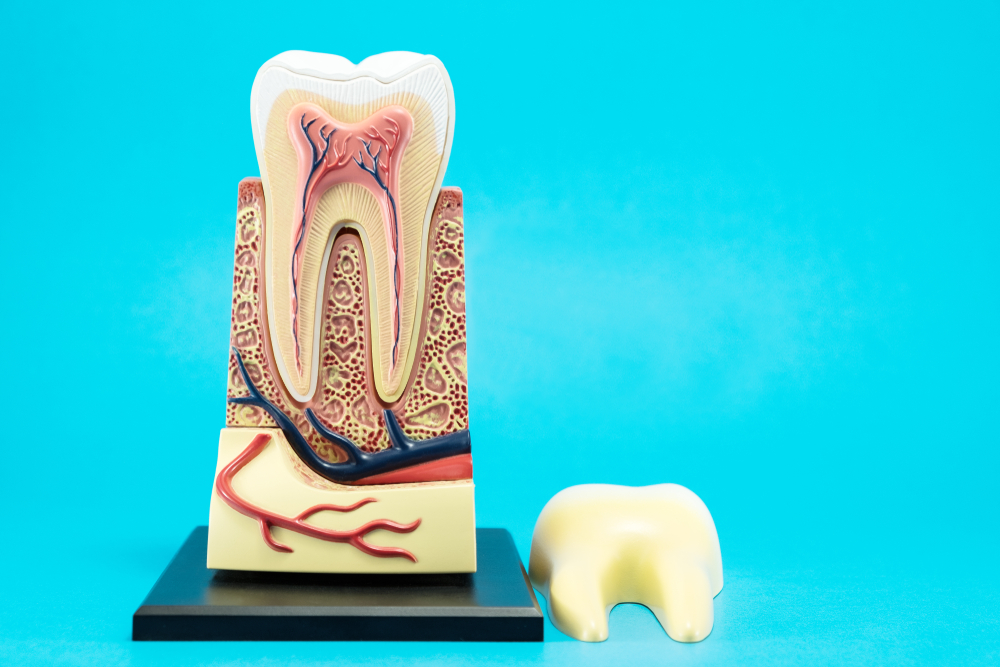In this blog from Medical Arts Dentistry in GA, we explain the anatomy of a tooth and what causes cavities to form.
What Is The Anatomy Of A Tooth?
To effectively address cavity formation, it’s important to appreciate the intricate layers that compose a tooth. Our teeth consist of:
- Enamel: The resilient outer layer, enamel, stands as the tooth’s guardian, defending against external threats. Composed primarily of hydroxyapatite minerals, enamel is a formidable protector but is not invincible.
- Dentin: Nestled beneath the enamel, dentin is a softer tissue housing microscopic tubules that connect to the tooth’s nerve center. Any compromise in the enamel can expose dentin, triggering sensitivity and discomfort.
- Pulp: The tooth’s core, the pulp, harbors blood vessels, nerves, and connective tissues. Invasion of bacteria into the pulp can lead to inflammation, pain, and potential infections, underscoring the importance of maintaining enamel integrity.
What Is A Cavity?
A cavity refers to a localized area of damage or decay on the surface of a tooth. It is commonly known as tooth decay or dental caries. Cavities develop when the hard outer layer of the tooth, known as enamel, is eroded by acid-producing bacteria in the mouth, typically in the presence of sugars and starches. As the enamel breaks down, it creates a small opening or hole in the tooth, and if left untreated, the decay can progress deeper into the tooth structure, affecting the softer dentin and, eventually, the pulp. Cavities can cause various symptoms, including toothache, sensitivity, and discomfort while eating or drinking. Effective preventive measures, such as regular dental hygiene practices and professional dental care, are essential in avoiding the formation and progression of cavities.
The Process Of Cavity Formation
Dental caries, or cavities, are a result of a process involving bacteria, dietary carbohydrates, and tooth structure. This process unfolds in a series of stages:
- Plaque Formation: The oral environment is a thriving ecosystem for bacteria, and when carbohydrates are consumed, bacteria produce plaque, a sticky film adhering to tooth surfaces.
- Acid Production: Bacterial metabolism of sugars leads to the production of acids, creating an acidic environment that gradually erodes enamel.
- Enamel Demineralization: Acid-induced demineralization weakens enamel, setting the stage for microscopic changes that pave the way for cavity development.
- Cavity Formation: Progressing through demineralization, cavities emerge as enamel succumbs to the onslaught. Once dentin is breached, the structural integrity of the tooth is compromised, requiring intervention.
Proactive Dental Care Strategies
1. Daily Oral Hygiene: Regular brushing and flossing constitute the bedrock of cavity prevention, ensuring the removal of plaque and maintaining optimal oral cleanliness.
2. Mindful Sugar Consumption: Limiting sugar intake starves bacteria, curbing plaque formation. A conscious approach to hidden sugars in processed foods is pivotal.
3. Harness the Power of Fluoride: Fluoride, a mineral fortifying enamel, is a potent ally. Ensure the use of fluoride toothpaste and consider professional fluoride treatments for enhanced protection.
4. Regular Dental Check-ups: Scheduled dental cleanings and check-ups are indispensable for early detection and intervention. Our team is here to provide personalized guidance and address emerging issues promptly.
The Health Risks of Untreated Cavities
Untreated cavities can lead to a cascade of serious health issues that extend beyond the confines of oral health. Initially, cavities may cause persistent toothaches, sensitivity, and difficulty in eating or speaking. As the decay progresses, it can penetrate through the enamel and dentin, reaching the tooth’s pulp where nerves and blood vessels are housed. This can result in painful dental abscesses or infections. If left unaddressed, these infections can spread to the surrounding tissues, causing facial swelling, fever, and even systemic complications.
Beyond the immediate oral consequences, untreated cavities have been linked to broader health concerns. Chronic oral infections have been associated with cardiovascular diseases, as the bacteria from the mouth can enter the bloodstream, contributing to inflammation and potentially affecting the heart. Additionally, there is a growing body of research suggesting connections between poor oral health and conditions such as diabetes and respiratory diseases. Therefore, the systemic impact of untreated cavities underscores the importance of proactive dental care not only for maintaining a healthy smile but also for safeguarding overall health and well-being. Regular dental check-ups and timely intervention are crucial to preventing the progression of cavities and mitigating the associated health risks.
Helping Children Prevent Tooth Decay
Supporting children in developing good dental hygiene is essential for their long-term health and well-being. As children often lack the awareness and discipline to maintain optimal oral care independently, parents and caregivers play a pivotal role in establishing healthy routines. By actively engaging in their children’s dental care, parents not only help prevent cavities and gum disease but also foster a positive attitude towards oral health that can last a lifetime. The early investment in teaching children how to properly care for their teeth sets the stage for a future where they prioritize and understand the importance of maintaining good dental hygiene, promoting not only a bright and healthy smile but also overall systemic health.
Choose Medical Arts Dentistry
At Medical Arts Dentistry, we are dedicated to the long-term dental health of Garden City, Richmond Hill, and the surrounding Savannah communities. We offer family dentistry for children and seniors, athletic mouthguards, dental sleep medicine, as well as treatments for TMJ and orofacial pain. If you’re ready for a regular check-up and professional cleaning, or a consultation about our other cosmetic dentistry options or dental restoration treatments, call 912-355-0605 for our Savannah location and 912-921-0401 for our Georgetown location.

